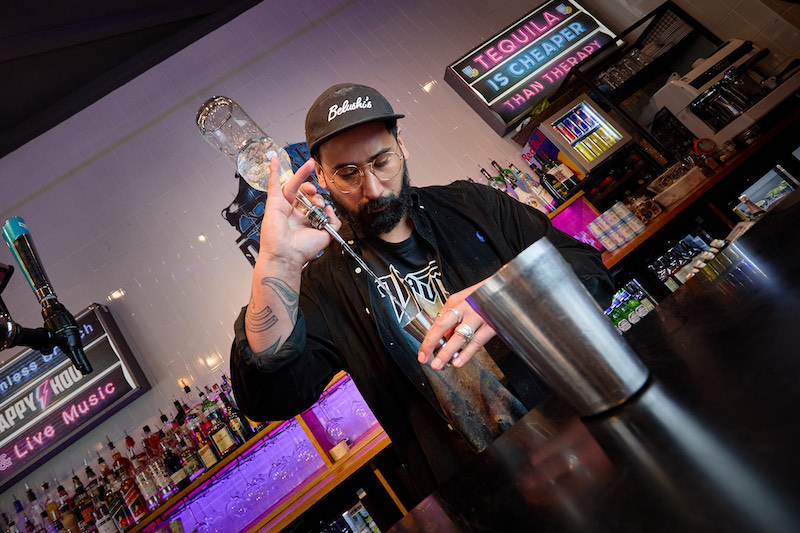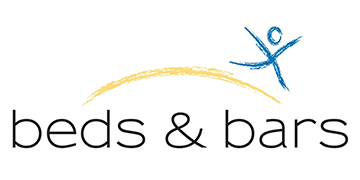
Interview With Chance Fisher, Head of People, Beds & Bars
- Uncategorised
- 21 July 2023
- No Comments
- admin
We sat down with Chance Fisher, Head of People at Beds and Bars, to chat about the award-winning Rising Stars course. Chance now leads the programme, having taken part as an employee when he worked as a Bar Supervisor, and has helped to develop its offering in recent years.
Rising Stars takes 12 selected applicants on a four-week journey that spans time with the Royal Navy in Dartmouth, a week in Barcelona practising public speaking, a period in Berlin learning about finance, and culminates in high-level presentations to the Beds & Bars board. Each applicant arrives with an idea that can have a positive impact on the business, and all 12 will refine, research and perfect their ‘brain children’ throughout the course.
Q. We know what the RS program has aimed for in the past. Do you want it to aim higher, further, or into something else this year?
A. Yes is the short answer. We’ve already started to expand on what we’ve done in previous years. This year has already surpassed previous Rising Stars years in terms of aiming higher. I think for future rising stars, it’s going to develop more and more as the years goes on and as I get more comfortable delivering it. I think if we start looking at the skills you guys are developing over the four-week period and seeing what skills we’re missing out on and then just start adding more on top of that, we’re in a fantastic position to improve and improve the course each year.
Q. You were a Rising Stars participant yourself – has this made you want to do some things differently now, as the organiser?
A. Yes. Again, we’ve already started doing things that are different to previous years and looking at organising content which Rising Stars will create and share of their own experiences between the weeks of activities is a great addition. Of course every week has got my own sort of spin on it,with week one being focussed on leadership, week two on public speaking, week three on finance – but I’m conscious of more or less keeping to the structure and the DNA of what Rising Stars is, because those things are fundamental to the course.
I felt the process could have been less rushed when I took part – so I’m conscious of giving current Rising Stars enough time to soak up information and really formulate their ideas which will be pitched to the board later this year.
Q. Things have changed since the last Rising Stars, changes related to the work world and the people’s relationship with it. What do you say are the biggest changes that are out of your control? And how do these changes affect the program?
A. There have been huge changes that we’ve all had to tackle and fundamentally change how we as managers and leaders motivate our teams at work. Covid and Brexit have changed the world massively and added to that a generational shift of employees that need and expect different things from the previous generation. We’ve then looked at the program and said, what are we trying to achieve here? Well, one, we’re trying to grow people within the business by providing them with a unique experience that will create 12 unique leaders.
Because of these shifts, we have had to make adaptations – for example, the leadership course in week one when we visited the navy was structured in a way that means anyone can thrive. The environment this week is still tough, but takes people’s mental health into more consideration, with a coaching approach. We’ve also held a lot of our interviews on Zoom, and of course the shift to digital communication has made it much easier for me to keep in touch with the Rising Stars who don’t live or work close to me.
Q. How would you say the Rising Stars program helped you in your professional life?
A. I was very disorganised when I went through the program myself. I was a supervisor when I started my program and I winged everything. I didn’t prepare for anything.
I wasn’t great at public speaking and I had a whole lot of talent, but not a lot of anything else. So professionally, it’s definitely helped me to ensure I’m prepared for any type of presentation. And I think, what it also has done is put me in front of people I wouldn’t usually be in front of. I think that’s one of the greatest strengths of the programme – it gives people the limelight to display their talent in front of people they might not normally meet, because we’re an international business.
Q. If there’s one thing you want Rising Stars participants to achieve, what would it be?
A. The biggest achievement would be to successfully implement an idea into the business that’s their own, of course, whether they win the prize money or not. I think that sense of self achievement right at the end of implementing your idea that makes an impact on either the culture, the engagement, or the sustainable goals of the business is what everyone should be striving for.
I think that’s the one thing I really want every participant to experience because once you do it, you’ve then got the blueprint to implement other things. I think our business is built on innovation, and if you’re continuously innovating and successfully implementing ideas, our people grow and then the business will grow with them.
Q. Did you take something from your Rising Stars experience into your personal life, or other spheres not-work related?
A. Yes – that it’s okay to ask for help. When you don’t ask for help, you shoulder everything that’s going on within your own programming, within your own world, and you’ve got outside responsibilities that can hit a bit of a roadblock. As soon as you ask for help, you start seeing that there’s plenty of people around you that want you to succeed – and they join your team against the problem.
Q. What would you say to employees that have applied this year and weren’t selected?
A. Come prepared and come organised. Some people were well organised and that’s why they got through. Other people had a whole lot of talent, but were disorganised, which I can sympathise with of course! Otherwise, be confident about your idea and dedicate some time to thinking this through, planning out a presentation and practising. I’d encourage every unsuccessful applicant to apply again next year – we want you to succeed!
Q. What do you think is your biggest challenge as the organiser?
A. I underestimated how far along people are in their career and how quickly people pick up the content I’m pushing out. Keeping the Rising Stars engaged as much as possible throughout the entire six months is the biggest challenge. One thing I have implemented which works well is keeping lines of communication open throughout the year, not just picking up where we left off each week. This means that every candidate has the opportunity to reflect on their performance and their ideas for much longer.
Q. What would you say is your biggest fear as the organiser?
A. That you get up in front of the board and choke. That means that I’ve not done my job correctly.
Q. What’s the purpose of the party shirts and odd socks participants must bring with them to every week? Is there a hidden objective behind this instruction, or are you just trying to use your influence as the organiser to set up a trend… or a cult?
A. I’ve done this at the hostel conference, I’ve done this on the sailing trip, I’ve done this for Rising Stars, I’ve successfully started a cult!




